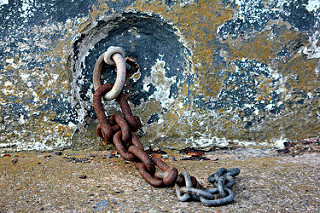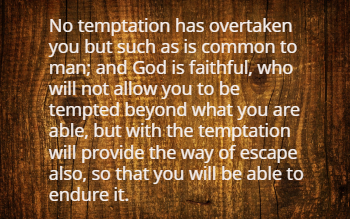How to Pray, Part 2
In review of part 1 of Jesus’ teaching about how to pray ("The Lord's Prayer"): Jesus is the Word of God and the Word of God carries the full authority of God. Jesus prayed that the Church would be brought to complete unity with Him and the Father through the Spirit. He seats us with Him at His right hand in that authority over the evil spirits. He wants us to express the authority of His Word in prayer.

He wants us to teach others about that conquering authority that gives people freedom from the fallen human nature. He wants people to know how to pray His will be done, so that His kingdom can come to people in this world now.
Freedom in a nation is relative to the degree that its people enjoy the blessings of His kingdom in their lives today. "The kingdom of God has come near to you." Freedom is anchored by the truth that governs His kingdom.
He gave us free choice in this life, so He wants us to choose to advance His will by praying and speaking His authoritative word. He wants us to seek first His kingdom and righteousness. He wants us to choose to let Him work through us to prepare the way of the Lord into people’s lives. His "will be done on earth as it is in Heaven” is the crux of the “how to pray” outline that Jesus gave us in Matthew 6.
Matt. 6: 9 "Pray, then, in this way: 'Our Father who is in heaven, Hallowed be Your name. 10 'Your kingdom come. Your will be done, On earth as it is in heaven. 11 'Give us this day our daily bread. 12 'And forgive us our debts, as we also have forgiven our debtors. 13 'And do not lead us into temptation, but deliver us from evil. [For Yours is the kingdom and the power and the glory forever. Amen.'] 14 "For if you forgive others for their transgressions, your heavenly Father will also forgive you. 15 "But if you do not forgive others, then your Father will not forgive your transgressions.
Daily Bread

Part 1 ended right before verse 11. The next three requests in Jesus’ teaching on how to pray in Matthew 6 are for ourselves personally. After telling us to focus on such high aspirations as, hallowing God’s name and His authority above all, His kingdom to come and His will be done, it seems like a deep nose dive to suddenly ask for today’s need for bread. “Give us this day our daily bread .“ There is good reason for it, though.
When we are dedicated to praying for His name to be glorified, His kingdom and the will of God to be done, we have a target on our backs. The evil spirit world will try to tempt us away from those lofty aspirations. They will tempt us with distractions of “the cares of this world”. If we don’t know where our family’s next meal is coming from, we will need to focus on that instead of those lofty things.
Another reason for prayer for daily bread is to remind ourselves that we are totally dependent on God for our sustenance. He is the “Bread of Life”. If our cupboards are always full and we have no concern about food, we can forget that we are indeed totally dependent on Him every day and every moment.
Our lungs breathe, and our hearts beat with His permission and sustenance. Even if we are wealthy, we should be mindful and prayerful about the fact that our lives are sustained moment by moment by Him alone. Catastrophe could cause dramatic losses at any time.
We need to fix our eyes on Him as our provider, protector and sustainer, so we won’t be distracted by the cares of life, as scripture says happens to believers sometimes. We need to remember that He is the spiritual Bread from Heaven and that we depend on Him for everything physical and spiritual.
Spiritual Warfare
The Church today tends to want to forget about Satan and His demons, but the scriptures are filled with the need to battle against Him with the authority of Jesus Christ. Satan does not wish for God’s kingdom to come. Therefore, our daily physical needs can be used by Satan to distract or disrupt our prayer for God’s will. When that happens, we focus on our needs and desires, rather than God’s will being done.
Right after teaching us the how to pray outline, Jesus warned in Matthew 6: 24 "No one can serve two masters; for either he will hate the one and love the other, or he will be devoted to one and despise the other. You cannot serve God and wealth. (Wealth must not become our master.) 25 "For this reason I say to you, do not be worried about your life, as to what you will eat or what you will drink; nor for your body, as to what you will put on. Is not life more than food, and the body more than clothing? Verse 33 "But seek first His kingdom and His righteousness, and all these things will be added to you. 34 "So do not worry about tomorrow; for tomorrow will care for itself. Each day has enough trouble of its own.
So, we are to pray for our physical needs daily. Christ is our spiritual “Bread”. We need to seek our daily personal relationship with him. If we lack our daily "bread", physical or spiritual, it can become an assault by the enemy to distract us from seeking God’s will and kingdom. We need daily provision and protection. Our physical bodies have physical needs. Not weekly or monthly, but daily. God wants us to learn and exercise faith in him and his constant provision.
Forgiveness and Prayer
In Jesus' instruction about how to pray, "forgiveness" of others is of vital importance! “…forgive us our debts, as we also have forgiven our debtors”. After we have accepted Christ as our Savior and have been justified freely by His death, we will continue to need forgiveness for sins that we will commit. Because we have been freely forgiven, we must learn to forgive others.
One of the greatest hindrances to prayer is a lack of forgiveness. That’s why Jesus was laser focused on that teaching in His instruction on how to pray. Even with His dying breath, what did He say about those who were crucifying Him? “Father, forgive them, for they know not what they are doing.” Forgiveness was what Jesus came to earth to accomplish. So, of course it would be included in His teaching about how to pray.
'And forgive us our debts, as we also have forgiven our debtors.” "For if you forgive others for their transgressions, your heavenly Father will also forgive you. "But if you do not forgive others, then your Father will not forgive your transgressions.”
This portion of the teaching about how to pray seeks to make sure our conscience is clear of any wrong doing. When our conscience still holds guilt, we lose faith. When our conscience is cleared by acceptance of the Lord’s forgiveness, we are confident and bold again to approach the ultimate authority of the throne of the God of the universe. When we understand the fullness of our undeserved forgiveness, we will begin to understand the need to forgive others.
The topic of forgiveness of others and ourselves needs a thorough consideration. When you are through with this page, please continue with "Forgiveness" here.
Pray for Protection from Temptation

Matthew 6:13 concludes the instruction on how to pray, 13 'And do not lead us into temptation, but deliver us from evil. [For Yours is the kingdom and the power and the glory forever. Amen.']
So, the first personal request in Jesus’ teaching about how to pray is about our constant dependence on God for spiritual and physical sustenance, represented by the words “daily bread”. The second personal request is regarding our relationship with God and other people. The third personal request is for protection from Satan himself. It is for protection from temptation.
When we seek, above all, to glorify His name, for His kingdom to come and His will to be done, Satan will also seek to distract us from all of that with temptations. The request is that God would keep us from temptation. We should not be confident that we can face temptation successfully. We should, instead, be confident in God to keep us from temptation. This part of the “pray like this” teaching, like the daily bread request, recognizes our total dependence on God for deliverance from Satan and his demons.

We should ask God to lead us away from temptation and to constantly deliver us from the evil one, because Satan does indeed “roam around like a roaring lion seeking whom he may devour” (1 Peter 5:8). We have no need to fear him, because we have the authority of the name of Jesus. That does not mean that we do not need God’s continual intervention to protect us from his sneaky, deceitful temptations to distract us. If he can distract us, he can cause us to have guilt, once again. He can keep us from praying effectively for His kingdom to come, and His will to be done on earth.
Learning How to Pray is a Way of Life
Even when we do sin, we have the promise of forgiveness of our sins, as long as we forgive those who sin against us. This whole “how to pray” teaching is a process that leads us deeper and deeper into a united relationship with the forgiving God of the universe. As that relationship builds, we can learn to "pray at all times in the Spirit" and "without ceasing".
This manner of prayer is a way of life that we are called to. It takes us progressively closer to the King of the kingdom of God; to the unlimited power and glory of the one true God forever.
That’s the God we serve. That’s the God we can love with all our “heart and soul and strength”. (Duet. 6:5) We are called to glorify His name, to prepare the way of His kingdom and to seek His will to be done on earth as it is in Heaven, today. That is our ultimate purpose of life on this earth. That is real freedom anchored solidly by truth. No one is really "free" without it.
When we seek to become one with Him, as Jesus prayed that we would, the Kingdom will be upon us now. The kingdom will come near to others now. Then God’s name will be glorified. For His is the kingdom and the power and the glory forever. That is why Jesus taught, “Pray like this.”
Did Jesus really mean, "Ask anything in My name and I will give it to you?"
New! Comments
Leave a comment in the box below.